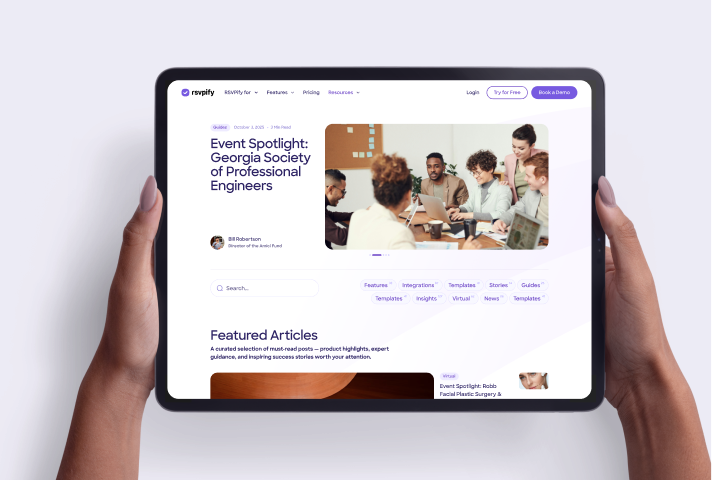Post-event surveys are an essential part of any successful event planning strategy. These surveys provide valuable feedback from attendees, which can be used to improve future events and enhance the overall attendee experience. Crafting the right post-event survey questions is crucial to obtaining accurate and actionable feedback. I
Let's explore the top post-event survey questions that event planners should consider including in their surveys. From measuring attendee satisfaction to gathering suggestions for improvement, these questions will help event planners gather the insights they need to make their next event even better.
Below is a mix of quantitative and qualitative prompts that uncover overall satisfaction, pinpoint high-impact moments, and highlight areas to refine for your next event.
This is an NPS-type question and is a good question to ask to kick-off your post-event survey. It is also a good practice to start off with more general questions and ask more specific questions towards the end of the survey.
This can also be an NPS-type question followed by an open-ended question where participants can provide more details about the things they liked/disliked about the items from the list.
This NPS-type question can also be followed by an open ended question where attendees and participants can provide more details about the topics they'd like to see in the future. Their suggestions can be a starting point for event hosts as they work and plan future events.
Sample Format:
This is an open-ended question type and is very important part of the post-event survey. Answers to this question provide insights into parts of the event that resonated the most with the event participants. It also helps event hosts identify what motivates guests to attend events in the first place, and allows them to tailor future events to their interests and preferences.
Event hosts might be hesitant to include this question in their post-event surveys. However, this open-ended question shows the participants that their opinions are valued and important. Furthermore, it allows the event hosts to learn from their mistakes and not repeat them at their next event(s).
Your attendees and participants may have ideas for new activities, topics or speakers that they'd like to see at the next event. They may also have suggestions for improving existing aspects of the event, such as the venue, food or vendors. Feedback they provide in this open-ended question helps event hosts create a more engaging, valuable and memorable event that attendees are excited to attend again.
On another note, by showing the attendees that their opinion is valued, event hosts foster a sense of community and engagement around their events. This helps them build loyal group of attendees and participants who are invested in the success of the event and are more likely to attend it and recommend it to others.
This can either be an NPS-type or close-ended question where attendees and other participants provide how enthusiastic they are to return to the next event. Answers to this question can be compared with the actual number of attendees who come back to the next event, and while ideally majority of them should return, if that is not the case, event hosts should consider what improvements need to be made.
Sample Format:
This open-ended question helps event hosts identify the marketing channels that were the most efficient at promoting the event. This information can be useful for future event planning when it comes to allocating marketing budget more effectively and strategically.
Event hosts nowadays rely on event management platforms more than ever. From collecting RSVPs and answers to custom questions to email communications and check-in on the day of the event, event management platforms are inseparable part of the event planning.
While the platform might do wonders for the event hosts, it might not be as intuitive to the guests and participants. It's important to ask this question and identify the areas where the platform might have fallen short as the last thing you want is for your guests to have trouble accessing your event website and registration form.
This can be a simple yes-no question, however, the answers to this question are very important. If they respond with yes, it is a good sign that they had a positive experience and would be willing to share that experience with others. It is also a good sign that they'd return to the event themselves. This can also indicate that the event met their expectations.
While it's not the end of the world if they respond with no, event hosts often add a follow-up question here to ask for more details to understand where the event fell short to meet their expectations. Understanding why some guests had a negative experience helps event hosts identify areas for improvement.
This can be a yes-no question, however, it's a better practice to ask this question in an open-ended format. It is more insightful and lets event attendees and participants reflect on the event as a whole and provide their opinions and feedback.
You should send your survey within 24 hours after the event while it's still fresh for attendees. It's also a good idea to send a reminder 2-3 days later to capture more responses.
While it depends on your event, 8-12 questions is a good length for balancing the insights you want while also increasing completion rate.
Industry standard is often 20-40%. Shorter surveys and quick follow-ups can often lift this rate further!
Now that you know what questions to include in your survey, you can check out the list of our favorite post-event survey tools and best practices when it comes to creating a survey.
About the Author
Get the latest product updates, event planning tips, and industry insights — straight to your inbox.
You can unsubscribe at any time. Your email will only be used to send RSVPify updates and will never be shared.
